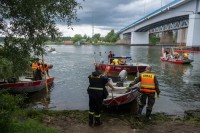Also recommended:
- AI experts in law firms - the new standard?
- “ABC” OF THE ENTREPRENEUR – SUCCESSOR ADMINISTRATOR
- “ABC” OF THE ENTREPRENEUR - SUSPENSION OF BUSINESS ACTIVITY
- "ABC" OF THE ENTREPRENEUR – CRIMINAL LIABILITY OF THE ENTREPRENEUR FOR NON-PAYMENT OF TAXES
- "ABC" OF THE ENTREPRENEUR - TAXATION OF BUSINESS ACTIVITY IN POLAND
Legal responsibility for the Oder ecological disaster
We are getting closer to knowing the key dates and places where the Oder catastrophe began - recent satellite analyses point to key days and places where this ecological damage may have originated. Hypotheses are already known from media reports that the salinity originated from post-industrial discharges, most likely located upstream, where there is negligible water exchange due to numerous dams. Following a trail of substance, the Regional Prosecutor's Office in Wrocław, which is investigating the case under Article 182 of the Criminal Code, has a hypothetical chance of identifying the perpetrators of the river poisoning and fish die-off. What is the legal responsibility for this?
According to Article 182 of the Criminal Code. "Whoever pollutes water, air or the surface of the earth with a substance or ionising radiation in such quantity or form that it may endanger human life or health or cause a significant reduction in the quality of water, air or the surface of the earth or destruction in the plant or animal world to a significant extent, shall be subject to a punishment of deprivation of liberty for a term of between 3 months and 5 years". In addition, if the consequence of the act is destruction in the plant or animal world to a considerable extent or a significant reduction in the quality of water, air or the surface of the earth, the offender shall be punished by imprisonment from 6 months to 8 years. However, it is highly probable that the law enforcement authorities will not succeed in establishing the culprits for the act of Article 182 of the Criminal Code. The number of issued convictions for the act under Article 182 of the Criminal Code, is negligible. An analysis of the jurisprudence in cases of offences against the environment leads to the bitter conclusion that their punishability in Poland is practically non-existent. However, when looking for the culprits for the environmental damage on the Oder River, one should consider the responsibility of the public administration institutions, and thus also of the public officials who failed to fulfil their duties by not reacting to the state of danger.
Legal environmental protection is the domain of administrative law and public administration institutions. According to the Act of 27 April 2001. - Environmental Protection Law, the administrative bodies set up to carry out public tasks concerning the environment and its protection are: the head of the local authority, the mayor or the president of the city, the starost, the sejmik of the voivodship, the marshal of the voivodship, the voivod, the minister responsible for the environment, the General Director of Environmental Protection and the Regional Director of Environmental Protection. Consequently, it most often takes the form of fines, suspension of activities that threaten the environment and quasi-compensatory sanctions. However, they are also obliged to take preventive or remedial measures if the entity responsible for the breach of environmental regulations cannot be identified, and always in the event that it is necessary to take such measures immediately due to the occurrence of a threat to human health or the occurrence of irreversible damage to the environment - this obligation is provided for in Article 16 of the Act on Prevention and Remediation of Environmental Damage. An authority that fails to take these measures in the situation described above thereby realises all the elements of the act under Article 231 of the Criminal Code, which are the failure to fulfil duties, the occurrence of an effect in the form of a threat of damage to private or social interests (even a purely hypothetical one, the effect being the state of threat itself) and the existence of a causal link between the two.
There is no doubt that the ecological disaster on the Oder caused damage to the public interest - after all, the environment is a common good and its contamination is a case of violation of the common good of citizens. Also economic losses, as damages expressed in money, concerning the costs of clean-up actions or future rehabilitation of its flora and fauna constitute a violation of the public interest. With this in mind, it can be considered that the relevant authority - most often it will be the provincial governor - by failing to take preventive or remedial action in the situations specified in Article 16 of the Act, commits an offence under Article 231 of the Criminal Code. A public official who, by exceeding his or her powers or failing to fulfil his or her duties, acts to the detriment of public or private interests, is subject to a penalty of imprisonment of up to 3 years.




